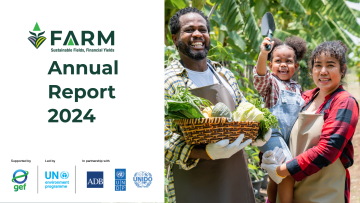
The Financing Agrochemical Reduction and Management (FARM) Programme has published its 2024 Annual Progress Report. The report highlights the programme's first steps towards transforming agricultural and food value chains by reducing the use of harmful pesticides and agricultural plastics.
Sustainable agrifood value chains are key to ensuring food security and safeguarding human health and ecosystems. However, agriculture is also a major contributor to the triple planetary crisis. It pollutes the environment and poses a serious risk to human health through the use of harmful pesticides and agricultural plastics.
FARM was designed as a bold response to these challenges. It is a five-year, $37 million programme funded by the Global Environment Facility (GEF), with an additional $341 million in co-financing. Led by the United Nations Environment Programme (UNEP) and implemented by the Asian Development Bank (ADB), United Nations Development Programme (UNDP) and United Nations Industrial Development Organization (UNIDO), FARM advances sustainable finance to transform agriculture by reducing reliance on harmful pesticides and agricultural plastics.
2024 marked the inception of FARM projects in six countries. Over 25 workshops, trainings, and stakeholder meetings were held, with 2,500 participants joining in person and online. The programme established strategic partnerships across its countries of implementation and beyond, including those with CABI, NRI and APRACA. Together with UNEP FI, FARM developed a joint work programme to promote the redirection of finance and investments towards low-input, pollution-free agriculture.
